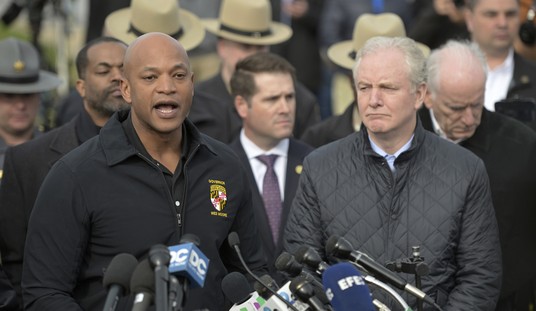Unless McCain either steps down or returns to the Senate soon, Trump and McConnell are operating with 50 Republican votes and a very real possibility, maybe probability, that no Democrats will flip.
To put that another way, every Republican in the Senate effectively has veto power over the nominee as things stand. At least until Joe Manchin or some other Democratic red-stater decides to play ball.
Is Rand preparing to exercise his veto?
something to watch: Sen. Rand Paul has some reservations about Kavanaugh, per a few of his friends plus a WH aide. He has voiced these privately in recent days, but not publicly, the people said. Waiting to see what POTUS does… Paul was unavail for comment.
— Robert Costa (@costareports) July 2, 2018
What are Paul's concerns? Friends of his tell me it's Kav's decisions on health care/ACA constitutionality + his work in W.'s White House. Paul World so far has been mum about all of this.
— Robert Costa (@costareports) July 2, 2018
No way to tell from hints that meager how deep Paul’s reservations might be. By “his work in W’s White House,” I assume he has in mind what Kavanaugh may or may not have contributed towards Bush’s post-9/11 programs on enhanced interrogation and warrantless wiretapping when he worked as associate counsel in the West Wing. Civil liberties are core concerns for Rand; if there’s evidence that Kavanaugh helped shape either program, that might be enough to make him walk. This subject has come up before when Kavanaugh was in front of the Senate, in 2006 when his confirmation hearing to sit on the D.C. Circuit was held. Kavanaugh told the panel told he “was not involved in the questions about the rules governing detention of combatants” when he worked in the White House, but it turned out the following year that that wasn’t strictly true:
In fact, in 2002, Kavanaugh and a group of top White House lawyers discussed whether the Supreme Court would uphold the Bush administration’s decision to deny lawyers to American enemy combatants. Kavanaugh advised the group that the Supreme Court’s swing voter, Justice Anthony Kennedy, would probably reject the president’s assertion that the men were not entitled to counsel. Kavanaugh had worked as a clerk for Kennedy. That meeting was first reported in The Washington Post. NPR independently confirmed the details with multiple sources.
Hard to see how that would be disqualifying for Paul. So long as Kavanaugh’s fingerprints aren’t on the policies themselves, Rand’s not going to torpedo him over a bit of legal advice, particularly when Kavanaugh erred on the side of civil liberties in giving it. As for his decisions on “health care/ACA constitutionality,” I assume that refers to his opinions in Sissel v. Department of Health and Human Services and Seven-Sky v. Holder, in which he twice upheld ObamaCare. Ed Whelan addressed those objections in a post a few days ago, though:
Sissel presented a very adventuresome Origination Clause challenge to Obamacare. In an opinion dissenting from the D.C. Circuit’s denial of en banc rehearing of the panel’s rejection of the challenge, Kavanaugh (joined by the three other Republican appointees on the court) did indeed conclude that Obamacare complied with the Origination Clause, even as he faulted the reasoning of the panel…
In his separate opinion in Seven-Sky, Kavanaugh did not “uphold” Obamacare. Rather, he explicitly dissented “as to jurisdiction” and refrained from “deciding the merits.” He concluded that the Anti-Injunction Act precluded the panel from deciding the case because Obamacare provided that the “tax penalty” for violation of the individual mandate had to “be assessed and collected in the same manner as taxes”—not because the penalty was itself a tax. At the same time, he called Obamacare’s individual mandate “unprecedented on the federal level in American history.”
Both of those rulings addressed ancillary matters in the great ObamaCare debate, not the guts of the conservative objection that Congress lacked commerce power to impose the individual mandate — although no doubt Kavanaugh will be pressed on his Seven-Sky opinion to clarify whether he believes on the merits that the mandate is a tax for constitutional purposes. Imagine a conservative SCOTUS nominee getting borked by a Republican senator for sharing the same constitutional opinion as the sitting, conservative-appointed chief justice of the United States.
Paul’s not going to nuke him for any of that, if in fact those are the grounds for the grumbling that Costa’s hearing about. Don’t forget, it was just two months ago that Paul faced another crucial vote that was important to Trump, whether to send Mike Pompeo’s nomination as Secretary of State out of the Foreign Relations Committee that Paul sits on. Republicans had a one-vote margin of error there too. Paul seemed intent on voting no due to objections over Pompeo’s hawkishness but Trump leaned heavily on him and in the end he held his nose and supported Pompeo in return for the nominee placating him by telling him that the Iraq war was wrong. A showdown over a State Department post carries about 1/100th as much pressure as a showdown over a Supreme Court vacancy does. Unless Democrats have Kavanaugh on video as a young lawyer burning the Constitution, Paul’s going to find whatever excuse he needs in order to vote for him.
Which is not to say that Collins and Murkowski will too. That’s why Manchin, Donnelly, and Heitkamp are so important to this vote, as insurance in case Collins or Murky gets cold feet. If you want to worry about Kavanaugh getting borked, worry about his thoughts on presidential power over a DOJ investigation that implicates the White House. If anything might force Manchin et al. to vote no for fear of pushing their base past the breaking point, it’s reason to believe that a nominee might vote to blow up Russiagate on the Court. Here’s Chris Wallace’s question about it yesterday to Leonard Leo:
WALLACE: I want to ask you specifically about Circuit Court Judge Brett Kavanaugh, who as you point out is one of the front runners. He has written that the president, not this president, any president should be exempt from, quote, time-consuming and distracting lawsuits and investigations which would ill serve the public interest, especially in times of financial or national security crisis.
Given the fact that President Trump is now facing lawsuits, given the fact that he is now dealing with a special counsel, wouldn’t be any kind of a conflict if he were to pick somebody like Brett Kavanaugh, who is on record was saying that he is opposed to that? That’s an issue the court might have to deal with.
Leo responded that Kavanaugh had written that about the old independent counsel statute, which placed the IC outside the president’s authority and therefore violated separation of powers according to Scalia’s dissent in Morrison v. Olson. The new special counsel statute, under which Mueller operates, presumably avoids that objection. But needless to say, Democrats will press Kavanaugh about this heavily if he’s the pick. He won’t lose Rand because of it but he may ensure that he ends up with 50 votes at best.
Via CNS, here’s Paul a few days ago not flinching on the abortion question. We need a pro-life justice, he insists.








Join the conversation as a VIP Member